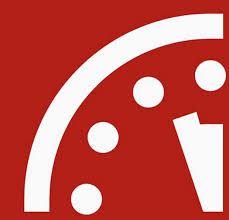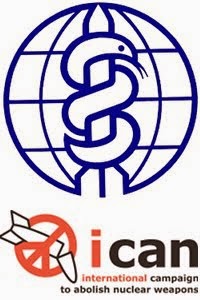[This post is from Peace Movement Aotearoa, New Zealand, and was originally published in 2009]
Nuclear Free and Independent Pacific Day ('Bikini' Day), 1 March, marks the anniversary of the US 'Bravo' nuclear bomb detonation at Bikini Atoll [*] in 1954. The explosion gouged out a crater more than 200 feet deep and a mile across, melting huge quantities of coral which were sucked up into the atmosphere together with vast volumes of seawater. The resulting fallout caused widespread contamination in the Pacific.
Powdery particles of radioactive fallout landed on the island of Rongelap (100 miles away) to a depth of one and a half inches in places, and radioactive mist appeared on Utirik (300 miles away). Radiation levels in the inhabited atolls of Rongerik, Ujelang and Likiep also rose dramatically. The US navy did not send ships to evacuate the people of Rongelap and Utirik until three days after the explosion. The people in the Marshall Islands, and elsewhere in the Pacific, were used as human guinea pigs in an obscene racist experiment to 'progress' the insane pursuit of nuclear weapons supremacy.
Nuclear Free and Independent Pacific Day is a day to remember that the arrogant colonialist mindset which allowed, indeed encouraged, the horror mentioned above continues today - the Pacific remains neither nuclear free nor independent.
It is a day to think about the many faces of colonisation - physical, cultural, spiritual, economic, political, nuclear, military - past and present; the issues of independence, self-determination and sovereignty here in Aotearoa New Zealand and the other colonised countries of the Pacific; and the ability of Pacific peoples to stop further nuclearisation, militarisation and economic globalisation of our region.
It is a day to acknowledge and remember those who have suffered and died in the struggle for independence around the Pacific; those who have opposed colonisation in its many forms and paid for their opposition with their health and life; and those who have suffered and died as a result of the nuclear weapons states' use of the Pacific for nuclear experimentation, uranium mining, nuclear weapons testing and nuclear waste dumping.
It is a day to celebrate the strength and endurance of indigenous Pacific peoples who have maintained and taken back control of their lives, languages and lands to ensure the ways of living and being which were handed down from their ancestors are passed on to future generations.
It is the day to pledge your support to continue the struggle for a nuclear free and independent Pacific, as the theme of the 8th Nuclear Free and Independent Pacific Conference said: No te parau tia, no te parau mau, no te tiamaraa, e tu, e tu - For justice, for truth and for independence, wake up, stand up !
- Peace Movement Aotearoa
[*] In 1946, a military officer representing the US government asked the people of Bikini if they would be willing to leave their atoll temporarily so that the United States could begin testing atomic bombs for "the good of mankind and to end all world wars". They have been prevented from returning to their home ever since because of the level of radioactive contamination remaining there.
In April 2006, together with the people of Enewetak, they filed a lawsuit against the US government in the US Court of Federal Claims. The lawsuit sought compensation for the taking of their property, and damage claims resulting from the US government’s failure and refusal to adequately fund the orders of the Nuclear Claims Tribunal. In 2000 and 2001 the Tribunal awarded compensation totaling around $948 million for loss of the islands, clean-up and resettlement costs, and personal injury and hardship. So far the Tribunal has only paid out about $3.8 million.
On 29 January 2009, the US Court of Appeals for the Federal Circuit ruled against the people of Bikini and Enewetak, saying an agreement between the governments of the United States and Marshall Islands in 1986 is a settlement that is beyond judicial review - affirming the US Court of Federal Claims ruling on 2 August 2007. The decision of the Court of Appeals is
available here, and the people of Bikini's response to the 2007 Court of Federal Claims ruling is here. A history of Bikini Atoll and the people's struggle for justice is on this web page.
###
Editor's Note: The following is their most recent call for negotiating a Nuclear Weapons Convention.
This year, New Zealanders have the opportunity to help turn the hope of a nuclear weapons-free Pacific, and indeed a nuclear weapons-free world, into a reality by adding their signatures to the International Campaign to Abolish Nuclear Weapons Aotearoa New Zealand (iCAN ANZ) petition to parliament.
The petition calls on the New Zealand government to actively engage with like-minded governments committed to abolishing nuclear weapons to launch, without delay, an initiative to start the process of negotiating a Nuclear Weapons Convention; and it will be considered by a parliamentary Select Committee later this month. The petition form is available on the iCAN ANZ website at http://www.icanw.org.nz
No Nuclear "fire and fury" Ever Again! Preventing the Unthinkable!
-
Dear Friends of a world free of nuclear weapons,
I wouldn't normally send another GZNonviolenceE-Newsletter so soon, but
these are anything but normal ti...
6 years ago












No comments:
Post a Comment